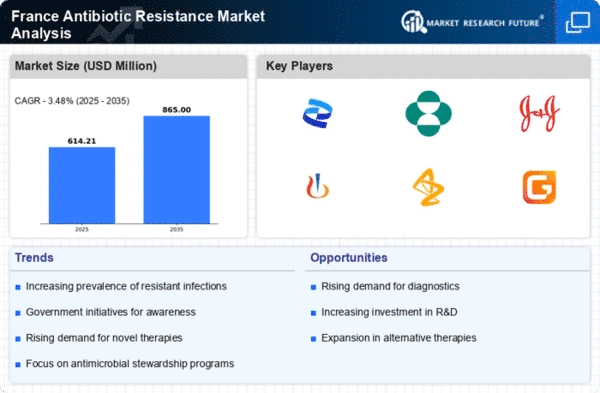Government Initiatives and Regulations
French government initiatives aimed at combating antibiotic resistance significantly influence the antibiotic resistance market. The French Ministry of Health has implemented stringent regulations to promote responsible antibiotic use and reduce unnecessary prescriptions. These policies include the 'Antibiotic Plan 2019-2021,' which aims to decrease antibiotic consumption by 25% by 2021. Such regulatory frameworks create a conducive environment for the development of new antibiotics and alternative therapies, as pharmaceutical companies align their strategies with government objectives. The antibiotic resistance market is likely to benefit from increased funding for research initiatives and public health campaigns, fostering innovation and collaboration among stakeholders. As a result, the market may experience accelerated growth driven by compliance with these regulations and the need for effective solutions.
Rising Incidence of Resistant Infections
The increasing prevalence of antibiotic-resistant infections in France is a critical driver for the antibiotic resistance market. Reports indicate that approximately 700,000 deaths occur annually worldwide due to antibiotic resistance, with a notable portion attributed to infections in France. This alarming trend compels healthcare providers and policymakers to seek innovative solutions, thereby stimulating demand for new antibiotics and alternative therapies. The antibiotic resistance market is projected to grow as hospitals and clinics invest in advanced diagnostic tools and treatment options to combat resistant strains. Furthermore, the economic burden associated with these infections, estimated at €1.5 billion annually in France, underscores the urgency for effective interventions, driving investments in research and development within the antibiotic resistance market.
Technological Advancements in Diagnostics
Technological advancements in diagnostic tools are reshaping the antibiotic resistance market in France. Innovations such as rapid diagnostic tests and next-generation sequencing enable healthcare providers to identify resistant pathogens swiftly and accurately. This capability is crucial in guiding appropriate antibiotic therapy, thereby reducing the misuse of antibiotics. The market for diagnostic solutions is expected to expand as hospitals and laboratories adopt these technologies to enhance patient outcomes. Furthermore, the integration of artificial intelligence in diagnostics may streamline the identification of resistance patterns, facilitating timely interventions. As a result, the antibiotic resistance market is likely to witness increased investment in diagnostic technologies, which are essential for addressing the growing challenge of antibiotic resistance.
Increased Collaboration Between Stakeholders
The antibiotic resistance market in France is witnessing increased collaboration among various stakeholders, including government agencies, healthcare providers, and pharmaceutical companies. This collaborative approach aims to address the multifaceted challenges posed by antibiotic resistance. Initiatives such as public-private partnerships are emerging to facilitate research and development of new antibiotics and alternative therapies. Additionally, stakeholders are working together to implement comprehensive surveillance systems to monitor resistance patterns effectively. This synergy is expected to enhance the antibiotic resistance market by fostering innovation and ensuring that resources are allocated efficiently. As collaboration continues to grow, the market may benefit from a more coordinated response to the antibiotic resistance crisis, ultimately leading to improved patient care and outcomes.
Rising Awareness Among Healthcare Professionals
There is a growing awareness among healthcare professionals regarding the implications of antibiotic resistance, which serves as a significant driver for the antibiotic resistance market. Continuous medical education programs and workshops are being conducted to inform practitioners about the responsible use of antibiotics and the importance of stewardship programs. This heightened awareness is leading to a shift in prescribing practices, with more clinicians opting for targeted therapies rather than broad-spectrum antibiotics. Consequently, the antibiotic resistance market is likely to see a rise in demand for novel antibiotics and alternative treatment options that align with these evolving practices. As healthcare professionals become more informed, the market may experience a transformation in how antibiotics are developed and utilized.

















